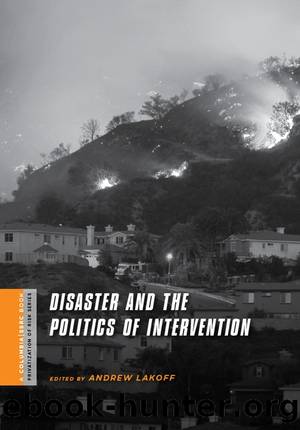Disaster and the Politics of Intervention by Andrew Lakoff

Author:Andrew Lakoff [Lakoff, Andrew]
Language: eng
Format: epub
Tags: Political Science, International Relations, General
ISBN: 9780231146975
Google: tumdAwAAQBAJ
Goodreads: 5740559
Publisher: Columbia University Press
Published: 2010-01-15T08:14:41+00:00
PRIVATE MILITARY FIRMS AND HUMANITARIAN ACTION: POTENTIAL BENEFITS
A client hiring a private military firm does so with a number of rational and reasonable hopes. It hopes to gain the efficiency and expediency that often come from the business domain. PMFs can offer the potential of greater flexibility and agility than state or international organizations and can often call on more experienced and better-trained personnel than state or local forces. Thus, they may be able to operate more effectively and in fewer numbers on the ground while âoutsourcingâ the political consequences of soldiers being killed or wounded in action.
A key benefit to humanitarian actors pondering going down this route is that hiring PMFs regularizes and even professionalizes their security. Many humanitarian organizations already hire armed escorts or guards from local warlords. For instance, NGOs operating in Afghanistan, Chechnya/Ingushetia, the DRC, Yemen, and Somalia have had to develop quasi-contractual relationships with local âsecurityâ units or warlord groups. The 2008 study, for example, found that for any humanitarian group operating in south-central Somalia, âarmed guards and escorts are omnipresent, and using them is widely viewed as the only possible way in which work can continue.â34 These relationships are often protection rackets in actuality, though; the guards are paid off mainly to prevent them or their affiliates from attacking an agencyâs assets or staff. If the choice is framed as between a khat-addled, teenaged gang member and a former Gurkha soldier, many humanitarians thus prefer the more professional alternative provided by PMFs.
Some argue that the role of PMFs could even go beyond the organizational client to include guarding local civilians, such as refugees. One firm, the International Executive Service Corps, has specifically targeted this sector in its marketing: âWe strive to bring harmony and stability to regions under conflict, quickly and with the minimum of disruption to the local population. We are able to rapidly deploy, allowing stability to return, thus enabling deployment of aid. Agencies are then able to carry out emergency relief unhindered and without fear of physical harm.â35 According to the owner of Blackwater, another controversial firm that has aggressively marketed this side of its business potential, professional forces bypass the expense and diplomatic difficulties of âlarge-footprintâ conventional forces.36
The most often cited case of privatizationâs promise in the humanitarian realm is the contrasting experiences in Sierra Leone of the firm Executive Outcomes and the UNâs peacekeeping operation. In 1995, the government of Sierra Leone was near defeat by the Revolutionary United Front (RUF). The government hired the PMF Executive Outcomes, made up of veterans from the South African apartheid regimeâs elite forces, to help rescue it. Deploying a battalion-sized unit of assault infantry, combat helicopters, light artillery, and a few armored vehicles, Executive Outcomes was able within weeks to defeat the RUF and stabilize Sierra Leone for its first election in over a decade. After its contractâs termination, however, war resumed. In 1999, the UN was sent in. But despite a budget and personnel size nearly twenty times those of the
Download
This site does not store any files on its server. We only index and link to content provided by other sites. Please contact the content providers to delete copyright contents if any and email us, we'll remove relevant links or contents immediately.
Cecilia; Or, Memoirs of an Heiress — Volume 1 by Fanny Burney(32561)
The Great Music City by Andrea Baker(32021)
Cecilia; Or, Memoirs of an Heiress — Volume 2 by Fanny Burney(31958)
Cecilia; Or, Memoirs of an Heiress — Volume 3 by Fanny Burney(31944)
We're Going to Need More Wine by Gabrielle Union(19050)
All the Missing Girls by Megan Miranda(16038)
Pimp by Iceberg Slim(14515)
For the Love of Europe by Rick Steves(14149)
Bombshells: Glamour Girls of a Lifetime by Sullivan Steve(14078)
Talking to Strangers by Malcolm Gladwell(13375)
Norse Mythology by Gaiman Neil(13372)
Fifty Shades Freed by E L James(13245)
Mindhunter: Inside the FBI's Elite Serial Crime Unit by John E. Douglas & Mark Olshaker(9346)
Crazy Rich Asians by Kevin Kwan(9295)
The Lost Art of Listening by Michael P. Nichols(7507)
Enlightenment Now: The Case for Reason, Science, Humanism, and Progress by Steven Pinker(7315)
The Four Agreements by Don Miguel Ruiz(6767)
Bad Blood by John Carreyrou(6625)
Weapons of Math Destruction by Cathy O'Neil(6283)
